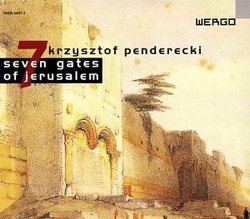Exciting and fascinating; superb Penderecki
Dr. Christopher Coleman | HONG KONG | 11/09/2000
(5 out of 5 stars)
"Penderecki's Seven Gates of Jerusalem is called his seventh symphony--but this is for reasons of numerology rather than accuracy. It is a fantastic piece--craftsmanship and inspiration of the highest order, but it is neither his seventh, nor a symphony. He has not in fact yet written his sixth symphony (although it exists in plan form) as the liner notes admit. And honestly, this is more of a cantata or oratorio than a symphony. But regardless of what it is called, it is a masterpiece that we will hear more and more often. Only the massive instrumentation will be a drawback to future performances. The pitch language is widely eclectic, ranging from plainchant to sound mass, but is mostly tonal, although this tonality is widely expanded for expressive purpose. Gesturally this is a successor to late Romanticism--Mahler echoes strongly in the slow middle section of the fifth movement, where the flute and horn solos over a motionless drone strongly resemble the passage in Mahler's Second Symphony just before the chorus enters in the last movement. And I heard allusions to Verdi's Requiem and a lot of Schostakovich and Bartok. I don't see these similarities as weaknesses, however--that all of these composers were working with advanced gestural and tonal ideas in the service of similar emotional portrayals might almost make such resemblances inevitable. In a nod to the modernists, the sixth movement is set for speaker and orchestra subtlely using many of the timbral/textural ideas Penderecki became famous for in the late 50s and early 60s. The overall effect of the entire piece most reminds me of Penderecki's Polish Requiem or the Third Symphony.Penderecki has found his place--it wasn't quite where the musical world anticpated on the strength of the early avant-garde pieces--but as a successor to Shostakovitch, Stravinsky and Bartok it is a worthy and honorable place. I strongly recommend this disc--I'll be listening to it over and over."
Flooring
Ryan T. Miller | Houston, TX, USA | 02/08/2004
(5 out of 5 stars)
"Penderecki is leading the movement to sustain and aggrandize the glory of classical music. To any of those who argue that this most lofty of art forms is but a monument to past, I respond that great composers still pen immortal works. These living composers must be encouraged and honored in their noble work. The museum mentality that infects most symphony orchestras must be extirpated, and new works such as this glorious symphony-cantata must be heard. Perhaps the solution is to establish orchestras devoted exclusively to the premieres and playing of new music, and leave untouched the orchestras specializing in the existing repertoire. In this way, audiences need not be coerced into attending concerts with new works by the old trick of playing Beethoven or some other universally-loved genius in the second half (which creates the problem of the late arrivals!). We could guarantee that those who are content to live in the past need not be exposed to new and exciting music. And, more to the point, a shrine will be created that provides a place for musical pilgrims to gather to hear the latest offerings. These New Orchestras could also commission numerous works--imagine, hearing a world premiere several times on one program! If the piece is meritorious enough, and if it captures the imagination of the public, perhaps it could enter the repertoire at the sister Old orchestra. Of course, I am certain that heavy subsidies will be necessary to sustain these New Music Orchestras, but surely supporting the arts is integral to any society purporting to civilization.
I apologize, as this review could be described as tangential (if the critic were being kind). Back to the 7 Gates...it is magnificent. Surely it ranks as a masterpiece, and is in many ways the culmination of Penderecki's artistic development. I agree with the reviewer below who declares that this is a different path than what Penderecki's early radical works indicated. I do greatly enjoy these pieces, but as a Romantic, I connect with his later symphonies in a more profound way. I am enthralled by this symphony so much, in fact, that my zeal prompted the earlier portion of this review--I desire to experience it live, and as yet it has not entered the repertoire. Let us hope that classical music may continue to thrive. I much prefer to pay homage to a living king, rather than visit an ornate grave and reminisce. Buy this disc, and other New Music, and join the Struggle."
Stunning "Mahlerian" composition
Crt Sojar Voglar | Ljubljana, Slovenia | 05/05/2005
(4 out of 5 stars)
"Krzysztof Penderecki hasn't written much powerful music since he has abandoned his "avant-garde" period in early 70-ies of the previous century. But "Seven gates of Jerusalem", which Penderecki counts as his seventh symphony (the number seven is the lucky number and the number of an angel), is finally an excellent composition in his late, romantic style. Written for voice soloists, choir, orchestra and narrator (in the sixth movement), it has influences from Beethoven's ninth, but more visibly, from Mahler's symphonies. That's why I call Seven gates of Jerusalem a "Mahlerian" composition.
Orchestration is impressive and very powerful, Penderecki knows how to operate with a large orchestra and balance between choir and orchestra, which includes many extra brass ensembles and less known percussion, such as mighty tubaphones in fifth movement. Nevertheless, there are no similarities with Penderecki's vocal music written in 60-ies. The choir and soloists sing traditionally, there are no harsh dissonant sections, no "experimenting", no radical moments in orchestration. But anyway, music is good. And that is what counts."


 Track Listings (7) - Disc #1
Track Listings (7) - Disc #1